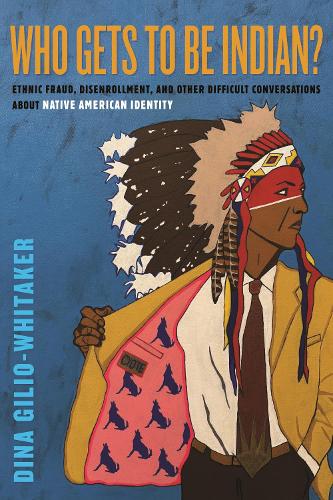
Who Gets to Be Indian: Ethnic Fraud, Disenrollment, and Other Difficult Conversations About Native American Identity
(Hardback)
Publishing Details
Who Gets to Be Indian: Ethnic Fraud, Disenrollment, and Other Difficult Conversations About Native American Identity
By (Author) Dina Gilio-Whitaker
Beacon Press
Beacon Press
18th November 2025
United States
Classifications
Physical Properties
Hardback
256
Width 152mm, Height 229mm
Description
An investigation into how Native American identity became a commodity, from cultural appropriation to ethnic fraud to disenrollment An investigation into how Native American identity became a commodity, from cultural appropriation to ethnic fraud to disenrollment Settler capitalism has been so effective that the very identities of Indigenous people have been usurped, misconstrued, and weaponized. In Who Gets to Be Indian, scholar and writer Dina Gilio-Whitaker (Colville Confederated Tribes) explores how ethnic fraud and the commodification of Indianness has resulted in mass confusion about what it means to be Indigenous in the United States. As an entry point to the seemingly intractable problem of ethnic fraud, Gilio-Whitaker critically looks to the film industry, including a case study of Sacheen Littlefeather, who is most known as the Native American woman that rejected an Oscar on behalf of Marlon Brando in 1973-though later revealed, she was not who she said she was. Gilio-Whitaker argues that this pretendian phenomenon originated in Southern California when the United States was forcing assimilation of Indians into white America culturally, but also into its capitalist economic system. With Indianness becoming a marketized commodity in the Hollywood film business, the field became open to anyone who could convincingly adopt an Indian persona. Deeply researched using socio-historical analysis, Gilio-Whitaker offers insights from her own experiences grappling with identity to provide clarity and help readers understand how the commodification of Indianness have ultimately left many people of legitimate American Indian heritage to be disconnected from their tribes. Personal and compelling, Gilio-Whitaker takes settler capitalism to task and helps us better understand how we got here in order to counteract the abuses of pretendianism and disenrollment.
Reviews
With clarity and conviction, Dina Gilio-Whitaker exposes whats at stake for Native people when Indianness becomes a commodity. A sharp, personal, and urgent look at the high cost for actual Native people in a system built to exploit them at every turn.
Kim TallBear, author of Native American DNA: Tribal Belonging and the False Promise of Genetic Science
Indigeneity is caught between truth tellers and tricksters. With abiding concern for tribal nationhood, Dina Gilio-Whitaker boldly espouses our truths while confronting the tricksters among us. Indigenous America needs more truth tellers like her and books like this.
Gabe Galanda, Indigenous rights attorney
Dina Gilio-Whitakers Who Gets to Be Indian tackles the problem of the commodification of Native identity at a crucial moment in American history. With incisive analysis, Gilio-Whitaker reveals how settler capitalism has distorted and exploited Indigenous identities and exposes the roots of folks pretending to be Native and its harms to Native communities. This book is a call to action and a vital tool for understanding how we can protect Indigenous people. A must-read for anyone seeking to confront the complexities of Native identity, sovereignty, and power in America.
Liza Black, author of Picturing Indians: Native Americans in Film, 19411960
Author Bio
Dina Gilio-Whitaker (Colville Confederated Tribes) is a lecturer of American Indian Studies at California State University San Marcos, and an independent consultant and educator in environmental justice policy planning. At CSUSM she teaches courses on environmentalism and American Indians, traditional ecological knowledge, religion and philosophy, Native women's activism, American Indians and sports, and decolonization. As a public intellectual, Dina brings her scholarship into focus as an award-winning journalist as well, contributing to numerous online outlets including Indian Country Today, the Los Angeles Times, High Country News and many more. Dina is co-author with Roxanne Dunbar-Ortiz of "All the Real Indians Died Off"- And 20 Other Myths About Native Americans, and As Long as Grass Grows- The Indigenous Fight for Environmental Justice from Colonization to Standing Rock.
